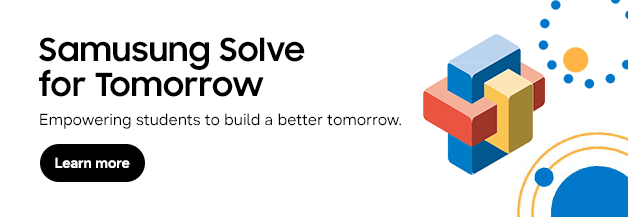Solve for Tomorrow OpEd: The Future of STEM Education is Social Impact
9/20/2023

Bloomington High School South’s Samsung Solve for Tomorrow student team showcased their Temp Mural project at the Wonderlab Museum ceremony, where they unveiled a mural art piece created with highly reflective, climate-positive barium sulfate paint, aimed at mitigating the effects of global warming. | Credit: Garrett Ann Walters
In a commentary for the education-focused media outlet Education Week, AP Biology teacher Dr. Kirstin Milks, who guided her Bloomington High School South student team to a Sustainability Innovation Award win in the 2022-2023 national Samsung Solve for Tomorrow STEM competition, writes that STEM-based social impact projects fuel growth and learning.
“At the end of the day, educators need to be able to find a way for students to feel they are having a positive impact. That’s where Solve for Tomorrow can be a big assist – as a program and process to help students organize their thinking and even strengthen their communications skills as they collaborate together to tackle big issues.”
Describing the path her students took to attain their $50,000 sustainability nod, the Bloomington, Indiana-based educator explains, “My Solve for Tomorrow students mentioned that climate anxiety had significantly shaped their life experience as they progressed to middle school and started seeing the world around them in a more expansive way. So that’s what my students asked to do: work on a ‘BIG THING,’ in their words, that would help mitigate the climate crisis.”
The science students focused on using highly reflective paint that can lower building temperatures by reflecting away sunlight and thereby reduce urban heat island effects. They enlisted art students to design and paint a mural highlighting climate change at Bloomington’s WonderLab Science Museum, demonstrating society’s ability to make a difference. The joint effort of science geeks and creative types sent a powerful message to the larger community.
Milks’ students definitely made an impact. “Here in Bloomington, it didn’t take long for them to make a big impact,” she writes. “A business incubator in town wants to use their paint on their new building. There’s been discussion at the municipal level about surveying and increasing the number of reflective white roofs in town. The Museum will paint another wall of their building with various paints to demonstrate their reflective values and 2 or 3 of my students will construct a family learning experience centered on their STEM solution.”
Another aspect of social impact that Milks stresses is that learning to do work that makes the world a better place for other people – and learning how to do that WITH other people – builds a sense of belonging – an antidote for loneliness, fear, and anxiety, as well as the lingering legacies of the pandemic.




